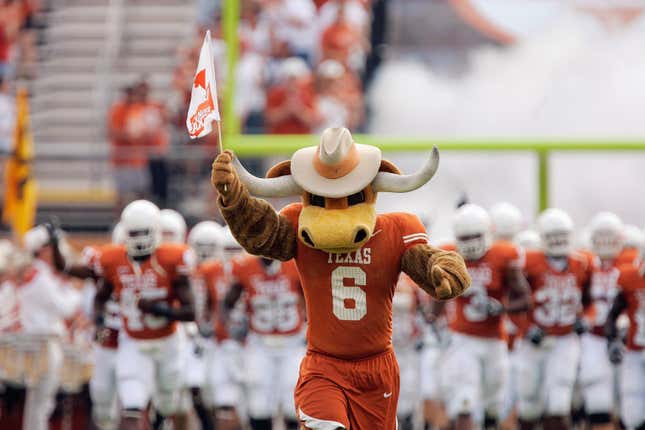
The University of Texas at Austin has a bit of a problem.
For well over a century, its school spirit song, “The Eyes of Texas,” has been ubiquitous. It’s performed at obscene levels at almost every official event, be it celebratory or otherwise, and sung by generations of students and school alumni as a means to affirm their bond as members of the UT-Austin family. The school itself calls it, “a longstanding symbol of The University’s academic and athletic achievements in its pursuit of excellence.”
There’s just one small problem: The history of the song is racist as shit.
As we previously reported at The Root, “The Eyes of Texas” was inspired by Confederate General Robert E. Lee and made its debut in 1903 during a campus minstrel show performed by white students in blackface. It’s become a particular source of contention on campus in the aftermath of the officer-related murder of George Floyd, with student-athletes protesting the song, school band members refusing to play it at home games during the 2020 football season, boosters threatening to pull donations if the school distanced itself from the song, and the revelation that UT-Austin forced players—many of whom who are Black—to stay on the field while the song played in order appease those same bigots pouring millions of dollars into the school.
Suffice to say, it’s a lot.
And now comes the latest chapter in this ongoing saga, as the Texas Tribune reports that a federal civil rights complaint has been filed alleging that by continuing to play the song at school events, UT-Austin is creating a “hostile environment” for Black students:
The Texas chapter of the NAACP, along with the civil rights organization’s University of Texas at Austin chapter and a group of anonymous students, has filed a complaint with the U.S. Department of Education’s Office of Civil Rights alleging UT-Austin is creating a “hostile environment” for Black students by continuing to play the “The Eyes of Texas” alma mater song at university events.
The complaint, filed Friday morning, alleges that Black students have been denied full benefits of Longhorn student life because the song is an official part of the university, “despite its racially offensive origin, context and meaning.” The song premiered at a minstrel show in the early 1900s where students likely wore blackface. Despite pushback, university officials have said they are going to keep the song as their alma mater, concluding in a report issued earlier this year that the song “had no racist intent.”
The complaint also accuses the university of “failing to respond to racial harassment against Black students and others who oppose the song, violating Title VI of the Civil Rights Act, and argues the university’s decision to create a separate marching band for students who do not want to play ‘The Eyes of Texas’ violates equal protections afforded under the Fourteenth Amendment.”
Basically, the school is being accused of fostering blatant racism and discriminatory behavior, which is pretty easy to validate considering football coach Steve Sarkisian admitted as much during his introductory press conference in January.
“We support that song. We’re going to sing that song, we’re going to sing it proudly,” he said, before circling back later. “That’s our song. And we’re fired up to sing it.”
It will be very interesting to see how this all plays out, especially considering those boosters have deep pockets and are unquestionably very well-connected throughout the state of Texas. But I commend those students for pushing back against something so blatantly offensive and hope they eventually prevail in the end.

